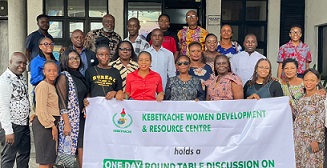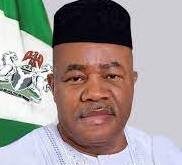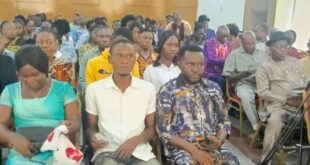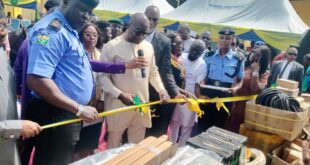By Paul Williams
Two years after it was promulgated into law, the implementation of the Host Community Development Fund, as contained in the Petroleum Industry Act (2021), has remained largely sketchy, further agitating members of oil-bearing communities in the Niger Delta who continue to bear the brunt of oil spills and pollution.
This formed the backdrop of a one-day Roundtable Discussion on Natural Resources Management and Petroleum Industry Act, organized by Kebetkache Women Development and Resource Centre, with support from Oxfam, for host community members, civil society actors and media in the Niger Delta.
Presenting a paper on ‘Natural Resources Management and Petroleum Industry Act,’ before a gathering of community representatives from Bayelsa, Rivers and Akwa Ibom states in Port Harcourt on Thursday, former president of the Movement for the Survival of Ogoni People (MOSOP), Legborsi Pyagbara, said that “The truth remains that as people from oil bearing communities, we’ve been demanding for a greater stake in the oil industry. And in response to that, the government claim to have created a Host Community Development Fund.”
He noted that “while it is positive in a way, it didn’t meet the expectations of the communities. First, you can’t give us 3 percent, while we are receiving 100% pollution. So, when you look at the risk, 3% cannot match the risks involved in pollution that the Niger Delta people are getting.
“Two, the transparency involved in even capturing the 3%. One would have naturally expected that it should be 3% of the budget. But 3% of OPEX makes one feel that there is something that is hidden. Because, when you do your OPEX, I will not sit down with you to design OPEX of your company.
“And OPEX cannot be standardized because it cannot be something that you say, ‘this year, it is going to be this, next year, it is going to be this.’ It all depends on whatever the oil company reports to you. As for me, I am quite convinced that OPEX can be manipulated as far as the oil industry is concerned.
“When it comes to the management of the fund itself, the companies are having a greater role, because the secretariat is being hosted by the company. So, they have a greater role in the management of the fund. Which, for me, also detracts from effective community participation in the management of the fund,” he said.
Pyagbara argued that communities should not be told that “they don’t have the right to manage their resources. If you say this money is for community, give them the latitude to manage that resource in a way that meets their own development needs and challenges.”
Commenting on the implementation of the Host Community Development Trust Fund, he said “Where it is now, because it has been passed into law, is for us to work around it, demand for its establishment, demand that the communities should be actually involved in the process of its establishment and its operation. If we are involved in its establishment, operation and the day-to-day running of the fund, we will know where the money is going and what it is used for.”
Community leader and president of Pius Dukor Foundation, Hon. Pius Dukor, drew attention to the fact that two years after, the Host Community Development Trusts Fund is yet to take off.
“I do think that right now, the Niger Delta community should reactivate itself, reorganize itself and begin to galvanize and recalibrate. In the sense that over two years now, they are dormant, they are not aware, they are docile. They are slow, and two years is counting. It means two years of neglect, two years of the fact that nothing has been happening.
“This is a document that the law says after one year, it should take off. Now it has not taken off. So, I think this (one-day discussion) is a reawakening call that all the communities should stand and query why there is such a neglect and slow pace of the PIA. By now, we would have been counting it, whether right or wrong. Rather, the PIA has not taken off at all,” he said.
Dukor stressed that “the law say after one year of signing that document by former President Muhammad Buhari, it (host communities’ 3%) would be calculated. So communities in the Niger Delta already have been owed money by the PIA law.
“So, I am now talking about arrears that would be paid in quantum of development. The caveat is that this money would be used in the development of the community, including the money from gas flare. Unlike before when the gas flare money was to be shared by the 36 states of the federation. Now the gas flare money would be given to the communities.
“It is important that we take up this money, take up the Host Community Development Trust Fund, and then work with it from that point. Within these two years of the PIA, communities in the Niger Delta are owed millions of Naira according to the law. And this will also include employment opportunities,” he said.
Program officer at Kebetkache, Mrs Idongesit Smart, who represented the executive director, Emem Okon, noted “most community people don’t really understand what is contained in the PIA. So, we are trying to break it down to their understanding,” adding that the training seeks to further enlighten them on the 3% host community development fund and how it can be of use to them.
“You know that the settlors have more powers in the PIA than the community people. These are the people that are being affected by oil spill, by gas flaring on a daily basis. But settlors have powers more than them. The power should belong to the community and not the other way round.”
She drew attention to the fact that the PIA, significantly contains provisions that appears to have ignored the needs and interests of community people, and women in the communities, in particular
“As a women organization, we are demanding that the PIA should be implemented in favour of women. Because most of the things that are in the PIA are not in favour of community people, are not in favour of women. Women in the community are not significantly carried along in the PIA. So, we want the government to ensure that women’s needs are accommodated in the implementation of the Act,” she said.
Smart noted that “in most communities, when we talk about this 3% (the provisions of the PIA), the women don’t even know the amount that the 3% translates to. This should be clarified for the women to know. We want women to be included in all forms of decision-making bodies as concerns this Act, starting from the communities, to the local councils, to the states and to the national,” adding that the role of women in the development of the society and nation cannot be understated.
Another resource person at the event, Hon. Henry Eferegbo, explained that the “PIA is a document that provides regulations, and sets out boundaries for government agencies – DPR, NOSDRA, which were overlapping before now. The PIA was able to streamline it, so that everybody now has a clear duty. Though the DPR no longer exists. It is now Upstream Petroleum Commission that has taken over their role.
“But the Act itself, has a lot of sections that are not in tandem with the realities in the communities. The Act has gone further to give so much powers to the settlor. They have power to nominate the trustees, the trustees will nominate the management committee, the management committee will nominate the community advisory committee. In all of it, communities have no role to play.
“The Act has gone further to incriminate communities by giving community duties to protect the pipelines. Any community where sabotage is noticed and production is lost, the amount that seems to have been lost, is what the community will lose in the benefit from the 3% operating cost that is stipulated in the Act.
“That ordinarily is obnoxious, because it is not the duty of the community to protect the pipelines. There are people who are saddled with that responsibility – the Nigerian Army, the JTF, the Civil Defense, the Police etc.
“Most importantly, most of the people who do this sabotage, do so without the consent of the community. Also, how can you say an unarmed community should protect a pipeline that ordinarily armed security agents couldn’t protect,” he asked.
 PH Mundial – Port Harcourt Online Newspaper News Across The Region
PH Mundial – Port Harcourt Online Newspaper News Across The Region





